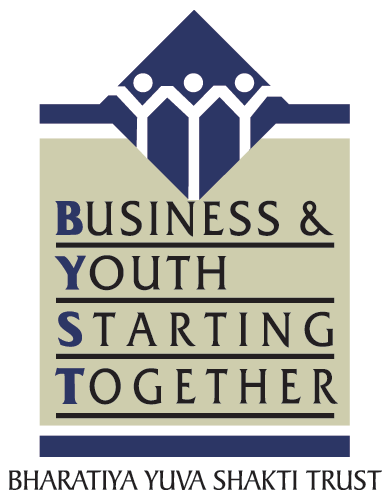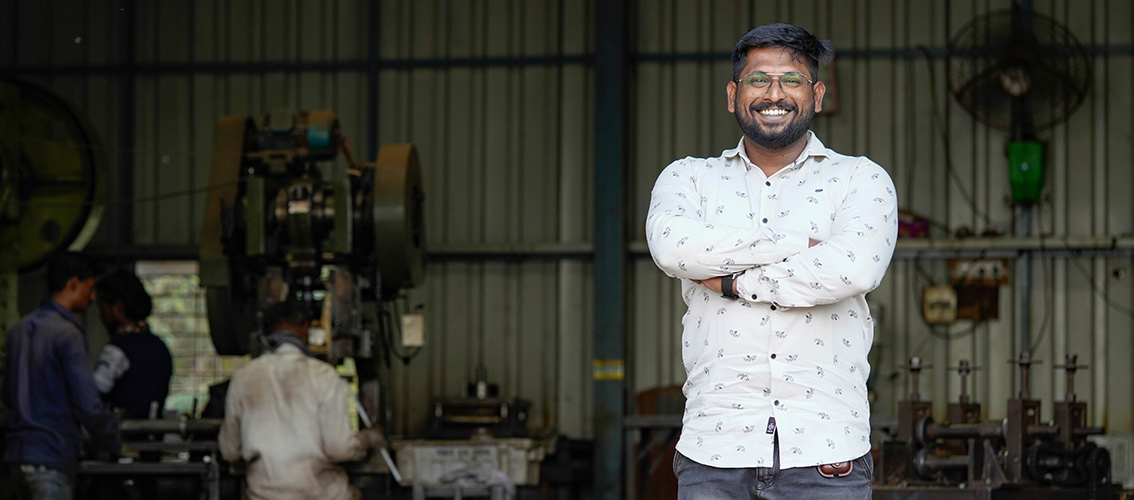Swapnil was born to a lower-middle class family, but he was born with dreams that stretched way beyond the limitations set by his socio-economic condition. Being the elder son to his parents, he observed intently as his father operated his own small business out of small piece of land that he had invested in many years ago. The amount of effort his father put in to bring home an income of INR 4.5 lakhs a year, gave him many important life lessons. The fact that his father struggled to make two ends meet, yet never compromised when it came to the education of his sons, made a huge impact on him, even as a child. As a result, he grew up to be grounded, but with his eyes set on greater achievements.
Staying true to his father’s vision, he did not let his financial circumstances affect his education as obtained an Engineering degree from a Governmental Open University. By the time he had become an adult, Swapnil was sure of two things – one, he wanted to become a job creator and not a job seeker; and two, he did not want to run his father’s fabricating business while doing so. The only thing he was unsure of, was what kind of business he wanted to run, or how to go about it.
He was only eighteen when he spotted a BYST advertisement in a Pune-based newspaper. Though still in school, he was so motivated by his dream of becoming an entrepreneur that he got in touch with BYST. That was 2007. Starting then, he attended every single BYST workshop even through his college and continues to do so till date. He feels every single time he attends a workshop, he gets to learn something new which helps his business knowhow.
Post college, he started working with a radiator manufacturing factory where he took up welding. It was while working here, that he realized he liked this area of work. So, when the factory owner decided to close the business down, Swapnil approached BYST to help him start his own manufacturing unit. BYST connected him to his mentor, Mr. Subhash Shejwal, who is also an engineer by degree, and an established serial entrepreneur with business interests in several sectors, including manufacture of engineering components and service industry.
Mr. Shejwal helped Swapnil refine his project idea, connected him to many industries who would require radiators, and guided him at each step. Initially, when Swapnil hesitated as he was unsure about withdrawing a loan for a big amount from the bank to start his manufacturing business, it was Mr. Shejwal who encouraged him to stay confident. BYST’s financial partners helped him with all loan-related paperwork and the loan came through in 2016. In 2017, Swapnil started manufacturing radiators. His thirst for knowledge being unquenchable, Swapnil continues to learn from BYST and his mentor, and has included learning about asset and project planning under Mr. Shejwal’s guidance into his future plans.
When Swapnil talks about his mentor, his eyes sparkle. “Without my mentor’s support, it would have been impossible to get a breakthrough in this field as a newcomer. Mr. Sejwal helped me learn how to network, he guided me about proper investments, and taught me how to save effectively. These savings helped me sustain my business during the pandemic,” he says. According to him, while theoretical knowledge is extremely important, it is a different level of advantage having access to a mentor’s guidance on real issues in real time.
Continuous interactions between the two has led Swapnil to develop many processes and innovations in his company.
Sky Power Industries, Swapnil’s venture, manufactures radiators for transformers and rectifiers. Radiators are used for cooling down distribution transformers. While traditionally radiator manufacturers weld the radiator fins from inside the pipe, Sky Power welds the fin from outside the pipe. This innovation cools transformers faster, consumes less power as compared to the conventional radiators and takes less space. The product becomes more cost effective without losing its efficacy. These pipes are also easier to repair since they are outside, making the process simpler, less time consuming and cheaper.
Passing this cost advantage to the customer by delivering the best quality at a lowest cost, Swapnil has created a customer-base in Pune, Mumbai, Goa, Telangana, and Karnataka in the past four years. He now has around 70 customers. Since 2017, his turnover has increased from 35 lakhs to over 1.4 crores. Currently, he manufactures two kinds of radiators and aims to start production of the third type from 2022.
In keeping with the times, he also uses the digital space to his advantage. From searching the internet to identify his clients, to creating a strong web presence with a website and LinkedIn profile, to using WhatsApp and online platforms for promotions, he makes sure he uses the power of digital marketing effectively.
Swapnil knows he has a long way to go. Importantly, the products manufactured by Sky Power Industries contribute to power generation. The market is estimated to grow at the rate of 200% year on year, given the Government of India’s focus on 100% electrification of all villages in India by 2022. Given the lower maintenance costs and lower frequency of breakdowns of their product, Swapnil knows that the government can reduce maintenance costs and expand the electrification coverage within limited resources. The savings in the electricity due to these radiators will also benefit more people due to limited power availability in the country, bridging the urban-rural divide. Not only that, radiators produced by Sky Power contribute to protecting the environment by reducing heat generation, saving power and reducing electricity consumption.
Every manufacturing business creates four indirect jobs through every direct job, and so, Swapnil’s venture today has created 20 direct and 60 indirect jobs. The next step for his business is to introduce gender-equality by hiring more women employees. His humble background also contributes to his prudence in spending. While he doesn’t cut corners, he does try to maximize the potential of every penny earned and spent in the business. This has helped him scale up his business from a turnover of INR 3.6 million in 2017 to INR 14 million in 2021.
Today Swapnil is turning all his dreams into reality one by one. He bought himself a car, ploughed some profits back to his business, built an industrial shed on the land where his father had set up his fabricating unit. Being self-employed has enhanced his family’s stature and standing in the society. Finally, the family is out of their miseries, living a comfortable life and extremely proud of the toil and hard work Swapnil put in to build a successful business.



